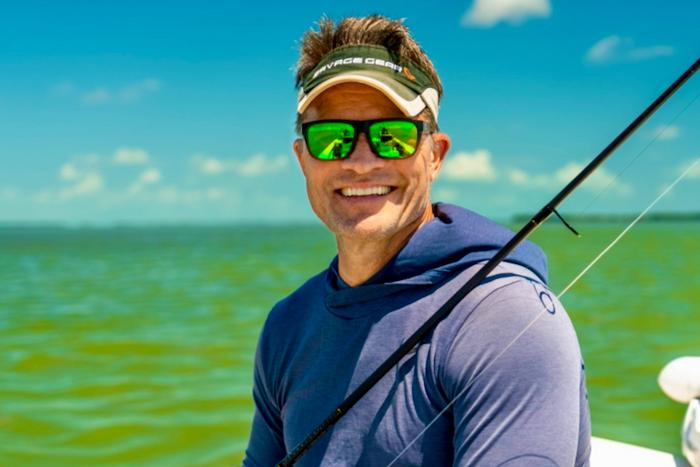Martin Grosell, professor and chair of the Department of Marine Biology and Ecology at the University of Miami Rosenstiel School of Marine, Atmospheric, and Earth Science, has been awarded the 2024 August Krogh Distinguished Lectureship of the Comparative and Evolutionary Section (CEPS) of the American Physiological Society. The Krogh Lectureship, sponsored by the Novo Nordisk Foundation, is the most prestigious award by the CEPS given to a distinguished scientist who has made major contributions to comparative and evolutionary physiology.

Credit: Rosenstiel School of Marine, Atmospheric, and Earth Science
Martin Grosell, professor and chair of the Department of Marine Biology and Ecology at the University of Miami Rosenstiel School of Marine, Atmospheric, and Earth Science, has been awarded the 2024 August Krogh Distinguished Lectureship of the Comparative and Evolutionary Section (CEPS) of the American Physiological Society. The Krogh Lectureship, sponsored by the Novo Nordisk Foundation, is the most prestigious award by the CEPS given to a distinguished scientist who has made major contributions to comparative and evolutionary physiology.
Grosell will deliver an honorary award lecture at the 2024 American Physiology Summit meeting in April in Long Beach, California. As the awardee, Grosell will also contribute a review manuscript based on his lecture for publication in the American Journal of Physiology: Regulatory, Integrative and Comparative Physiology.
“Receiving this award, named after August Krogh, a Nobel Laurate in Physiology or Medicine and one of the most influential scientists in biomedical, comparative, and integrative physiology, is a tremendous honor. I am deeply grateful to the nominators and members of the American Physiological Society for this recognition” said Grosell.
The Grosell lab studies salt, water, and acid-base balance in fish and assess the impacts of environmental stressors, both natural and anthropogenic, on these important physiological processes. He works on a range of experimental animals chosen based on the research question and employs a wide range of techniques covering levels of biological organization ranging from molecular through intact animal physiology and population level biology. Grosell’s research on physiology of aquatic animals has pronounced implications for global biogeochemical cycles.
Grosell collaborates extensively with international colleagues, colleagues at the National Oceanic and Atmospheric Administration (NOAA), and at the Rosenstiel School. Currently, Grosell leads a group of about 6 graduate and undergraduate students and has published over 260 peer-reviewed papers, books, and book chapters on the physiology and mechanistic toxicology of aquatic organisms.
Grosell obtained his Master’s in Science in 1993 and Ph.D. in 1997 from the University of Copenhagen, Denmark, at the August Krogh Institute. He joined the Rosenstiel School in 2002 and is the Maytag Professor of Ichthyology, with a specialty in environmental physiology and toxicology.
Grosell was the lead principal investigator and director of RECOVER (Relationships of Effects of Cardiac Outcomes in fish for Validation of Ecological Risk) from 2015 to 2020. RECOVER was funded by the Gulf of Mexico Research Initiative (GoMRI) to investigate the impacts of oil and dispersants on the ecosystems of the Gulf of Mexico following the Deepwater Horizon oil spill on April 20, 2010.
“We are very pleased Martin is being recognized for his vast contributions to comparative and evolutionary physiology by the American Physiological Society,” said Roni Avissar, Dean of the Rosenstiel School. “This is a prestigious recognition of his achievements and we are very proud of him and the positive impact this award has on our institution.”
Throughout his career, he has been the recipient of numerous awards, including: the University of Miami’s Provost Award for Scholarly Activity, graduate student mentor, and undergraduate student advisor of the year at the Rosenstiel School. Grosell’s past awards include the Society of Experimental Biology Presidents Medal, and the Award of Excellence from the Physiology section of the American Fisheries Society.
About the University of Miami
The University of Miami is a private research university and academic health system with a distinct geographic capacity to connect institutions, individuals, and ideas across the hemisphere and around the world. The University’s vibrant and diverse academic community comprises 12 schools and colleges serving more than 17,000 undergraduate and graduate students in more than 180 majors and programs. Located within one of the most dynamic and multicultural cities in the world, the University is building new bridges across geographic, cultural, and intellectual borders, bringing a passion for scholarly excellence, a spirit of innovation, a respect for including and elevating diverse voices, and a commitment to tackling the challenges facing our world. Founded in the 1940’s, the Rosenstiel School of Marine, Atmospheric, and Earth Science has grown into one of the world’s premier marine and atmospheric research institutions. Offering dynamic interdisciplinary academics, the Rosenstiel School is dedicated to helping communities to better understand the planet, participating in the establishment of environmental policies, and aiding in the improvement of society and quality of life. www.earth.miami.edu.




